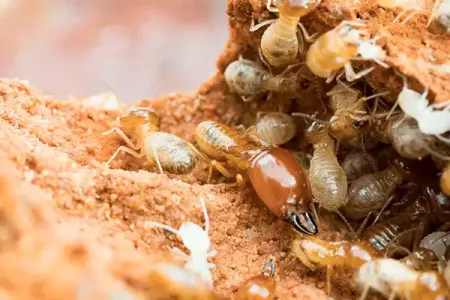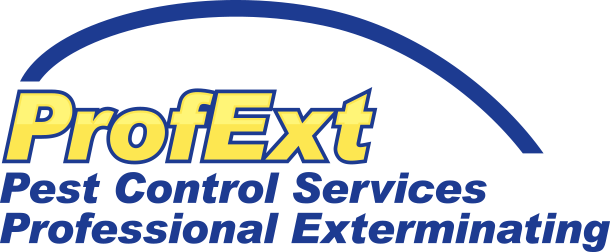
The most common type of termite found in Connecticut properties is the subterranean termite. These termites live and nest under the ground and prefer to feed on pieces of wood that are water-damaged or decaying. Use our termite guide to learn about termites, how to control them, and the termite treatments we offer at ProfExt Pest Control. We are here to help you keep termites out of your home.
Termites are a wood-eating pest. Their feeding habits cause significant structural damage to homes and commercial properties nationwide each year. Subterranean termites are social insects; their colonies are made up of different castes – each tasked with their own job. The three primary castes of a termite colony are workers, soldiers, and reproductives. Workers make up the majority of any termite colony but are rarely seen because they spend their time under the ground or inside pieces of wood. Soldiers defend the colony when there is a breach in a piece of wood or nest, and the reproductives produce new termites.
Frequently Asked Questions About Termites
Are termites dangerous?
Termites are not directly dangerous to people; in fact, we rarely, if ever, come into contact with these subterranean pests. However, termites are extremely dangerous to the structures of our homes. As a group, termites cost Americans more than five billion dollars each year. While termites won't cause significant damage overnight, an infestation left unnoticed leads to costly damage, which you must repair to protect the structural integrity of your home. Unfortunately, most homeowners' insurance policies won't cover termite damage. When it comes to termites, being proactive is vital to avoid the damage they will cause to your home and bank account.
Why do I have a termite problem?
Termites can become an issue on any property that offers them a suitable place to nest, moisture, and easy access to food sources. When termites live outside, near your home, they will eventually find a way inside while out foraging for food. Subterranean termites move indoors through spaces in the foundation, crawl spaces, or pieces of wood on your home, making direct contact with the ground.
Once inside, they seek out damp areas and invade pieces of water-damaged wood. Leaky pipes, poor ventilation, and roof leaks can allow moisture into your home. Once termites discover your home can provide their colony with a reliable food source, they will return daily.
Where will I find termites?
One of the easiest-to-recognize signs that a termite colony lives in or near your home is witnessing a termite swarm. During the spring, it is common for black, winged reproductive termites to swarm from a mature colony to find a mate and start a new colony. If you ever see swarms of winged termites or piles of discarded insect wings in or near your home, immediately contact a local termite company.
Outside, termites nest under decaying tree stumps, firewood piles, fallen trees, landscaping ties, and mulch. In our homes, termite infestations often occur in basements, crawl spaces, wooden posts, door or window frames, and wooden joists.
When termites are in your home, you aren't going to see them moving around like you would if you were dealing with an ant infestation. They keep their presence hidden, and in most cases, the damage they cause is noticed before you ever come across a termite in your home.
How do I get rid of termites?
Finding evidence of termites in a home is never a welcome discovery. To get rid of an active termite infestation and prevent its return, ProfExt Pest Control offers proactive termite control. Our locally-owned company is committed to going above and beyond and providing discreet services to meet our customers' unique needs. Our highly trained professionals will guard your home against termites with the help of our effective barrier treatments. To learn more about avoiding termite damage or to receive a free estimate, please reach out to us today.
How can I prevent termites in the future?
Help avoid the damage termites can cause with the following prevention tips.
- Eliminate excess moisture outside your home by ensuring irrigation and drainage systems are in good working order.
- Ensure gutters are clear and downspouts direct rainwater away from your home.
- Repair roof damage and damage to weatherstripping that can allow water to seep into your home.
- Use dehumidifiers and air-conditioners to reduce humidity levels in your home.
- Quickly repair your home's leaky pipes.
- Replace any wood that has been damaged by water that is on or in your home.
- Remove fallen trees, tree stumps, and other wood debris from your property.
